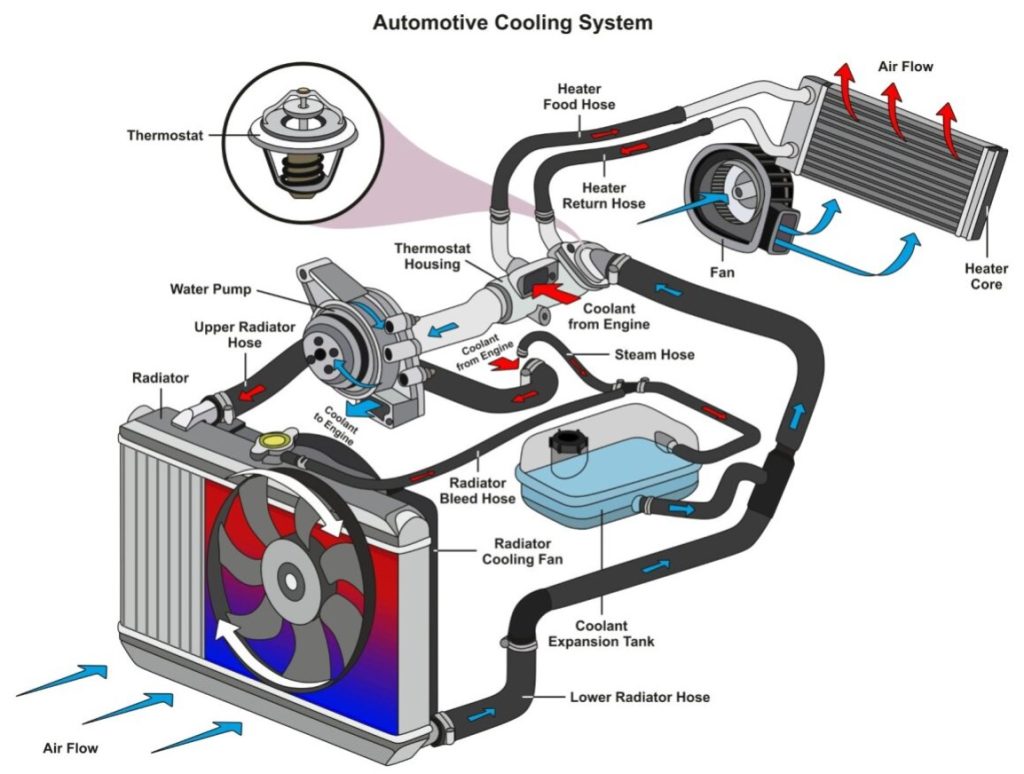The radiator is a crucial component responsible for circulating coolant through the engine and keeping it cool. If the radiator becomes damaged, it can’t properly cool the engine, and this can lead to overheating and severe damage. You should look out for the warning of trouble and visit your Chevrolet Service Department immediately for radiator repair.

White Smoke From the Hood
If there is white smoke coming from your hood or tailpipe, your Chevrolet is leaking coolant. As coolant leaks from the system, it comes into contact with the hot components under the hood. When burned, it produces a white smoke with a sweet smell.
Coolant leaks can be caused by a cracked radiator, a bad head gasket, or even a cracked or missing radiator cap. You need a certified Chevrolet technician to inspect the cooling system and fix the underlying leak. Otherwise, the coolant leak will cause the engine to overheat.
Visible Leaking Fluid
Visible leaking fluid underneath your Chevrolet could signal a coolant leak. If the leaking fluid is green, red, pink, or orange and is pooling under the front of your vehicle, it is the coolant. Coolant leaks can spell trouble for your Chevrolet because it needs the fluid to cool down the engine. Your dealer should fix the leak, flush the radiator, and refill the system with fresh coolant.
Rising Temperature Gauge
Is your Chevrolet’s engine temperature gauge creeping up towards the red even when the AC is off? This is a sign of radiator issues. When the engine is in operation, the radiator should circulate coolant through the system and dissipate heat to the outside.
If the radiator is clogged, damaged, or has a faulty fan, it won’t cool your engine properly. As a result, the temperature gauge will start to rise abnormally. Low coolant can also hinder proper cooling and cause the engine to overheat. Don’t ignore rising temperatures, as they can cause engine components to fail.
Damaged Radiator Hoses
Pop your Chevrolet’s hood and inspect the hoses that carry coolant from the radiator to the engine. If the hoses look brittle, cracked, or swollen, they should be replaced. As radiator hoses age, they can wear out from internal coolant pressure, causing them to lose coolant. Replacing the old, worn-out hoses should restore your cooling system’s operation.
Radiator Rust or Discoloration
If your radiator is showing signs of corrosion, all is not well inside the system. The rust builds up inside the radiator and blocks proper coolant flow. Rust deposits can also contaminate the coolant and reduce its ability to absorb heat from the engine. If you have a corroded radiator, you should replace it with an OEM one to ensure proper coolant circulation.
If your Chevrolet is showing signs of radiator trouble, it’s only a matter of time before the engine’s performance is affected. Visit Golf Mill Chevrolet, and our Chevrolet-certified technicians will repair your radiator and restore its cooling capabilities.





